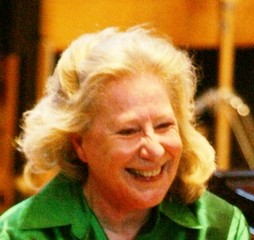|
Back
A Universe of Notes New York
BargeMusic
05/22/2021 -
Frédéric Chopin: Nocturnes, Opus 27, in C-sharp minor & in D-flat Major – Nocturne, Opus 32, No. 2 – Nocturnes, Opus 37, in G minor & in G Major
Elliott Carter: Two Diversions – 90+ – Caténaires
Frederic Rzewski: Friendship
Ursula Oppens (Pianist) 
U. Oppens (© Hilary Scott)
“Bach is an astronomer, discovering the most marvelous stars. Beethoven challenges the universe. I only try to express the soul and the heart of man.”
Frédéric Chopin (1810-1849)
“Debussy’s ‘La Mer' is full of all sorts of sounds and textures going on at once, yet we still look at is as beautiful, structured and fluid. That’s all I’m trying to do; I’m not out to compose for complexity's sake.”
Elliott Carter (1908-2012)
Ursula Oppens just might have objected the title “Eclectic Series” tagged onto her extraordinary one-hour concert last night at BargeMusic. Ms. Oppens, whose name is synonymous with 20th and 21st music, would hardly consider the premieres she has performed–from Ligeti to Carter to Rzewski’s loadstone work–“eclectic.” Her fingers danced over the difficulties of Carter’s Caténaires with the same effortless elegance as she played five Chopin Nocturnes last night.
And I have serious doubts that she ever asked a composer who dedicated a piece to her, “Well, what does it mean?” It means the notes that were laid out for her. And she gives her music the oomph, the bravado, the vivacity which they deserve.
True, Ms. Oppens might be associated more with Rzewski and Carter than Frédéric Chopin. And true, last night, her Chopin Nocturnes were apparently played more with her fingers than her memories or emotions. Still, one could easily relate the lines of the playful Two Diversions to the more soulful counterpoint of the Polish Romantic.
Ursula Oppens was the idea artist to open the BargeMusic post-pandemic season. Yes, she frequently performs here (once with Rzewski himself in the audience). Yes, her virtuosity goes hand in hand–literally–with her understanding. And yes, her attitude, her beatific smile after each work, her nuances that we in the audience are the important visitors, make a concert a thing of joy.
But most important for this listener is that she csn take the most supposedly recondite algorithmic composition and make it absolutely logical.. Not logical philosophically or structurally, but with a logic of understanding.
So when she finished Carter’s Two Diversions, we didn’t have to say, “Huh?”, we could take the title literally, we could be diverted with a delicious metaphor of different speeds and slownesses passing each other, contrasted with each other. We didn’t have to analyze Einstein, but we could picture trains going in different directions at the same time.
And after two Chopin nocturnes, Carter’s 90+ was another diversion. I doubt I would have understood what the “90” stood for. But Ms. Oppens explained how Carter took 90 separate notes, to celebrate the 90th birthday of Goffredo Petrassi, and transformed them with rhythms, colors, tempos.
As possibly the world’s most accomplished extant of Frederic Rzewski, I am certain her performance of Rzewski’s Friendship was authoritative. At thiis first hearing, I didn’t quite get it. He is a man of ideology, so perhaps I missed the notes behind the title. Later, I will listen again.
To close the hour (only an hour??), Carter again gave a whirligig work. Caténaires was a piece without harmonies, but possessing in its single line a cosmos of spaces, accents and permutations, albeit with Looney-Tunes crazy music, that we went along for the roller-coaster ride.
One might have judged such gamesmanship inferior to Chopin’s professed soaring to the “soul and heart” of humankind. But Ms. Oppens creates the universe of great artists without judgments, only the obligation to offer her frequently ineffable artistry.
Harry Rolnick
|